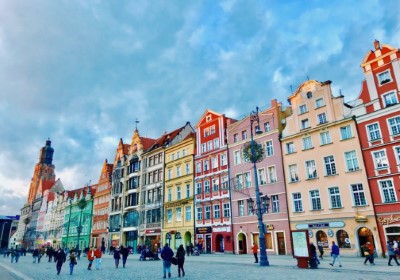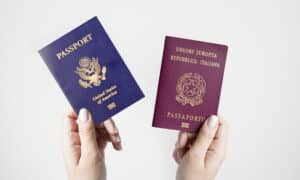
This dual citizenship status allows you to hold a second passport, access social benefits in both nations, and enjoy greater freedom of movement. But what does dual citizenship really mean, and how do you qualify?
In this guide, you’ll learn how to get dual citizenship, understand the pros and cons, including why some people think dual citizenship is bad, and explore the requirements and dual citizenship processes in the US:
What does dual citizenship mean?
Dual citizenship, also known as second citizenship, is the legal status of being a citizen of two countries at the same time. This means you hold the rights, privileges, and responsibilities of both nations, including the ability to own property in a foreign country, work without a visa, and hold a second passport.
Some examples include:
- A child born in the United States automatically acquires U.S. citizenship, even if their parents are foreign nationals.
- If both parents are U.S. citizens and their child is born abroad, the child typically gains U.S. citizenship through descent.
According to the Global Intelligence Unit’s report “The Transformation of Citizenship“, over 76% of nations now recognize dual citizenship (compared to only 33% in 1960). This reflects a significant shift in flexible citizenship models.
However, some countries still do not allow or acknowledge dual citizenship. If you inform your home country’s government of your desire to apply for dual citizenship in a foreign country, you might be rejected or have to renounce your current citizenship.
Benefits of Dual Citizenship

Greater travel freedom: Dual citizenship allows you to hold a dual passport, which means you can enter and exit each country freely and often travel to additional destinations without a visa. This is especially valuable if your second passport offers better global mobility.
Work and business opportunities: As a dual citizen, you can live, work, and run businesses in both countries without the need for work permits or special visas. This flexibility can open new markets, create investment options, and enhance your career prospects.
Access to social services and benefits: You can take advantage of healthcare systems, education, pensions, and other social services in the other country where you hold dual citizenship. This can significantly improve your and your family’s quality of life.
Property ownership rights: In many countries, only citizens can buy or inherit real estate without restrictions. Dual nationality gives you the right to purchase property and invest in international real estate in both nations.
Political participation: Dual citizens usually have the right to vote, run for office, and engage in political activities in each country. This enables you to stay involved in the civic life of both places.
Cultural and family connections: Having citizenship in your ancestral country helps you preserve cultural ties and maintain family heritage. It can also make it easier for your children to claim citizenship by descent.
Safety and security: Being a dual citizen with a second passport can serve as an important safety net or Plan B during times of political unrest, conflict, or natural disaster, giving you more options to relocate or protect your family.
Tax optimization and financial flexibility: Depending on the countries involved, dual citizenship can offer tax advantages, access to investment incentives, and more financial planning options. Some countries have tax treaties to help prevent double taxation.
How do I obtain dual citizenship?
To acquire dual citizenship (or even triple citizenship), both your current country and the foreign country must legally permit holding multiple nationalities. If they do, you can obtain dual citizenship through several recognized pathways:
By birthright
Dual citizenship can be automatically and legally granted if you are born in one of the countries with birthright citizenship. Not all countries offer this pathway so be aware of this.
Example: A child born in Canada automatically acquires Canadian citizenship, even if their parents have foreign citizenship in another country.
By ancestry
It is also known as citizenship by descent. This is the process whereby your family ties can determine your citizenship.
Example, if you hold citizenship by naturalization in Australia and have a grandparent born in Poland, you can acquire Polish citizenship by descent and gain dual citizenship in both Australia and Poland.
By naturalization
Through the process of citizenship by naturalization you can qualify for dual citizenship provided you’ve resided in a country for a required period and meet certain legal criteria, such as passing language or civic tests.
Example: After living in Canada for several years and meeting residency requirements, an individual can apply for Canadian citizenship.
By marriage
Citizenship by marriage is another way individuals can gain dual citizenship. If your spouse is a citizen of a foreign country, you may have the right to citizenship with a reduced residency period.
Example: A foreign spouse of an Italian citizen may become eligible for Italian citizenship after a certain period of marriage and residency.
By investment
Citizenship by Investment programs allow individuals to acquire dual citizenship by making a qualifying economic contribution, often without lengthy residence requirements.
Example: An American investor makes a government-approved economic contribution to the St. Kitts and Nevis citizenship by investment program and receives dual citizenship within 6 months in both the United States and St. Kitts and Nevis.
Countries That Allow Dual Citizenship
Some countries fully acknowledge dual citizenship, while others allow it only in specific situations or for particular individuals. Here is a list of countries that allow dual nationality, but is not an exhaustive list.
Country | Allow Dual Citizenship | Conditions or Exceptions |
Afghanistan | No | A former citizen of Afghanistan who was displaced due to political instability or war and acquired new citizenship may hold “unofficial” Afghan citizenship. |
Albania | Yes | |
Algeria | Yes | |
American Samoa | Yes | |
Andorra | No | Citizens of Spain are permitted dual citizenship |
Angola | Yes | |
Antigua and Barbuda | Yes |
|
Argentina | Yes | Citizens of reciprocal countries can obtain dual citizenship in Argentina, |
Armenia | Yes | |
Australia | Yes |
|
Austria | No | Austria typically prohibits dual citizenship, except in special circumstances, such as for individuals who acquire another nationality at birth or those granted special permission. |
Azerbaijan | No | |
Bahamas | No |
|
Bahrain | No |
|
Bangladesh | No | Bangladeshi nationals and their children with foreign citizenship must apply for a Dual Nationality Certificate. |
Barbados | Yes |
|
Belarus | No |
|
Belgium | Yes |
|
Belize | Yes | |
Benin | Yes | |
Bhutan | No | |
Bolivia | Yes | |
Bosnia and Herzegovina | Yes | Permits dual citizenship if there is a bilateral agreement between the two states. |
Botswana | No | Dual citizenship allowed until 21 years age. |
Brazil | Yes | |
British Virgin Islands | Yes |
|
Brunei Darussalam | No | Dual citizenship permitted until 18 years old. |
Bulgaria | Yes |
|
Burkina Faso | Yes |
|
Burundi | Yes |
|
Cambodia | Yes | |
Cameroon | No | Dual citizenship permitted until 21 years old. |
Canada | Yes |
|
Cape Verde | Yes |
|
Central African Republic | Yes |
|
Chad | N/A |
|
Chile | Yes |
|
China | No |
|
Colombia | Yes |
|
Comoros | Yes |
|
Costa Rica | Yes |
|
Croatia | Yes |
|
Cuba | No |
|
Cyprus | Yes |
|
Czech Republic | Yes |
|
Democratic Republic of the Congo (Kinshasa) | No | Dual citizenship permitted until 21 years old. |
Denmark | Yes |
|
Djibouti | Yes |
|
Dominican Republic | Yes |
|
Dominica | Yes |
|
East Timor | Yes |
|
Ecuador | Yes |
|
Egypt | Yes |
|
El Salvador | Yes |
|
Equatorial Guinea | Yes |
|
Eritrea | No |
|
Estonia | No |
|
Eswatini | No |
|
Ethiopia | No |
|
Fiji | Yes |
|
Finland | Yes |
|
France | Yes |
|
Gabon | N/A |
|
Georgia | No | Allowed only when a foreign president grants citizenship based on exceptional merit. |
Germany | Yes | No restrictions as of June 2024. |
Ghana | Yes |
|
Greece | Yes | |
Grenada | Yes | |
Guatemala | Yes | |
Guinea-Bissau | Yes | Permits dual citizenship if emigration was motivated by economic factors. |
Guinea | N/A | |
Guyana | No | |
Haiti | Yes |
|
Honduras | Yes | Allows dual citizenship if a treaty exists with that country. |
Hong Kong | Yes |
|
Hungary | Yes |
|
Iceland | Yes |
|
India | No | India does not allow dual citizenship in the traditional sense but the Government of India offers the Overseas Citizenship of India (OCI) card to Persons of Indian Origin (PIOs) who have acquired citizenship of another country. |
Indonesia | No |
|
Iran | No |
|
Iraq | Yes |
|
Ireland | Yes |
|
Israel | Yes |
|
Italy | Yes |
|
Ivory Coast | Yes |
|
Jamaica | Yes |
|
Japan | No | Japan does not allow dual citizenship. Individuals with multiple nationalities must choose one before reaching the age of 22. |
Jordan | Yes |
|
Kazakhstan | No |
|
Kenya | Yes |
|
Kiribati | No |
|
Kosovo | Yes |
|
Kuwait | No |
|
Kyrgyzstan | Yes |
|
Laos | No |
|
Latvia | Yes |
|
Lebanon | Yes |
|
Lesotho | No | Dual citizenship permitted until 21 years old. |
Liberia | No | Dual citizenship permitted until the age of maturity. |
Libya | No |
|
Liechtenstein | No |
|
Lithuania | Yes | Permits dual citizenship only in certain circumstances. |
Luxembourg | Yes |
|
Macau | Yes |
|
Madagascar | No |
|
Malawi | No | Dual citizenship permitted until 22 years old. |
Malaysia | No |
|
Maldives | No | |
Mali | Yes |
|
Malta | Yes |
|
Marshal Islands | Yes | |
Mauritania | No |
|
Mauritius | Yes |
|
Mexico | Yes |
|
Micronesia | No | Dual citizenship permitted until 18 years old. |
Moldova | Yes | |
Monaco | No |
|
Mongolia | No |
|
Montenegro | No | Allows dual citizenship only if a bilateral treaty exists with the other country. |
Morocco | Yes |
|
Mozambique | Yes | |
Myanmar, Burma | No | |
Namibia | Yes |
|
Nauru | Yes | |
Nepal | No | Nepal strictly prohibits dual citizenship. Acquiring a foreign nationality results in the automatic loss of Nepali citizenship. |
Netherlands | No | The Netherlands generally does not allow dual citizenship, requiring individuals to renounce their previous nationality upon naturalization. Exceptions exist, such as for those who cannot renounce their original citizenship or for spouses of Dutch citizens. |
New Zealand | Yes |
|
Nicaragua | Yes |
|
Nigeria | Yes | Allows dual citizenship for Nigerian citizens by birthright. |
Niger | Yes |
|
North Korea | No | |
North Macedonia | Yes |
|
North Macedonia | Yes |
|
Norway | No | Allows dual citizenship if original nationality cannot be relinquished. |
Oman | No |
|
Pakistan | Yes | Allows dual citizenship only if a bilateral treaty exists with the other country. |
Palau | No | Dual citizenship permitted until 21 years old. |
Palestine | N/A |
|
Panama | Yes |
|
Papua New Guinea | Yes | |
Paraguay | Yes | Dual citizenship allowed for citizens by birth or ancestry where an international treaty exists. |
Peru | Yes |
|
Philippines | No |
|
Poland | Yes |
|
Portugal | Yes |
|
Qatar | No |
|
Republic of Congo (Brazzaville) | Yes |
|
Romania | Yes |
|
Russia | Yes |
|
Rwanda | No |
|
Samoa | Yes |
|
San Marino | No |
|
Sao Tome and Principe | No |
|
Saudi Arabia | No |
|
Scotland | Yes | |
Senegal | N/A | |
Serbia | Yes |
|
Seychelles | Yes |
|
Sierra Leone | Yes |
|
Singapore | No | Singapore does not permit dual citizenship. Citizens who acquire another nationality may lose their Singaporean citizenship. |
Slovakia | No |
|
Slovenia | Yes | Allows dual citizenship for citizens by birth or descent. |
Solomon Islands | No | Dual citizenship permitted until 18 years old. |
Somalia | Yes |
|
South Africa | Yes | While South Africa allows dual citizenship, citizens must apply for and obtain permission to retain their South African citizenship before acquiring another nationality. |
South Korea | Yes |
|
South Sudan | Yes |
|
Spain | Yes | Dual citizenship allowed for citizens of Latin American countries, Andorra, the Philippines, Equatorial Guinea, or Portugal, or for Spanish citizens by birthright their second citizenship within three years of acquiring it. |
Sri Lanka | Yes | An Application for Retention must be submitted to be eligible for dual citizenship. |
St. Kitts and Nevis | Yes |
|
St. Lucia | Yes |
|
St. Vincent and the Grenadines | Yes |
|
Sudan | Yes |
|
Suriname | No |
|
Sweden | Yes |
|
Switzerland | Yes |
|
Syria | Yes | |
Taiwan | Yes |
|
Tajikistan | Yes | Dual nationals will only be considered citizens of Tajikistan. |
Tanzania | No | Allows dual citizenship until 18 years old. |
Thailand | Yes |
|
The Gambia | Yes |
|
Tibet | Yes |
|
Togo | No |
|
Tonga | Yes |
|
Trinidad and Tobago | Yes | Allows dual citizenship only for citizens of Trinidad and Tobago by birthright. |
Tunisia | Yes |
|
Turkey | Yes | |
Turkmenistan | No |
|
Tuvalu | N/A | |
Uganda | Yes | |
Ukraine | No |
|
United Arab Emirates | No |
|
United Kingdom | Yes |
|
United States | Yes |
|
Uruguay | Yes |
|
Uzbekistan | No |
|
Vanuatu | Yes |
|
Vatican City | Yes | |
Venezuela | Yes |
|
Vietnam | Yes | |
Yemen | Yes | Dual citizenship requires prior permission. |
Zambia | Yes | |
Zimbabwe | Yes | Dual nationality allowed only for citizens by birthright. |
Dual Citizenship in the U.S.
Does the US allow dual citizenship?
While the U.S. law does not explicitly encourage holding multiple citizenship, it does recognize and allows dual citizenship for U.S. citizens in most cases, as long as both the United States and the other country permit it.
The United States does not require you to renounce your U.S. citizenship if you acquire a foreign nationality.
As a result, you can become a dual citizen through birth, descent, marriage, or naturalization in another country while retaining your American citizenship.
How do you get dual citizenship in the U.S.?
To get dual citizenship in the U.S., a person usually needs to become a U.S. citizen first, either by naturalization or by having U.S. citizenship passed down to them. Naturalization means they must meet certain rules, like having a green card for 3 to 5 years, showing good behavior, passing tests about U.S. history and English, and making a promise to be loyal to the country.
How long does the process take?
Sending your citizenship application to USCIS is the first step. The whole naturalization process can take up to 1.6 years, depending on which USCIS office handles your case and how early you apply.
How Can Global Citizen Solutions Help You?
Global Citizen Solutions is a boutique migration consultancy firm with years of experience delivering bespoke residence and citizenship by investment solutions for international families. With offices worldwide and an experienced, hands-on team, we have helped hundreds of clients worldwide acquire citizenship, residence visas, or homes while diversifying their portfolios with robust investments.
We guide you from start to finish, taking you beyond your citizenship or residency by investment application.

Frequently Asked Questions about Dual Citizenship
What does dual citizenship mean in simple terms?
Dual citizenship means you are legally recognized as a citizen of two countries at the same time.
You hold the rights and responsibilities of citizenship in both places, including the ability to live, work, and vote. It’s also called dual nationality.
What is the difference between dual citizenship and second citizenship?
Dual citizenship means you are legally recognized as a citizen of two countries at the same time, holding the rights and responsibilities of both nationalities.
Second citizenship is often used as a broader term to describe acquiring citizenship in another country, whether or not your original country formally allows dual status.
How does dual citizenship work when traveling?
As a dual citizen, you can hold a dual passport and use each one depending on your destination.
For example, you may enter and leave the United States with your U.S. passport and use your second passport when traveling or entering your other country of citizenship.
This makes crossing borders easier and often eliminates the need for visas.
Is a dual passport the same as dual citizenship?
No, a dual passport and dual citizenship are different.
A dual passport refers to physically having two valid passports, while dual citizenship means you legally hold citizenship status in two countries. You can only get a dual passport if you have dual nationality.
What makes you a dual citizen?
You can become a dual citizen by birthright (being born in a country that grants citizenship) or by descent if your parents are citizens of another country.
Other common ways include naturalization, marriage to a foreign citizen, or citizenship by investment programs.
Can dual citizenship be revoked?
Yes, in some cases dual citizenship can be revoked.
For example, if you commit fraud during the application process or voluntarily renounce your citizenship, a government may withdraw your nationality.
Why is dual citizenship considered bad by some people?
Some consider dual citizenship risky because of potential double taxation, military service obligations, and conflicting laws between the two countries.
It may also limit access to certain government jobs or security clearances. Others worry about divided allegiance or complications with property ownership.
Do dual citizens have to pay taxes in both countries?
Depending on the countries involved, dual citizens may be taxed by both governments on their income.
The United States, for example, taxes citizens worldwide. However, tax treaties and credits often help avoid double taxation for Americans with dual citizenship.
What is the difference between dual citizenship and permanent residency?
Dual citizenship grants you full rights of nationality in both countries, including voting and holding a passport.
Permanent residency only allows you to live and work in a country without citizenship rights like voting or a second passport. Permanent residents can lose their status more easily than citizens.
Can anyone obtain dual citizenship?
Not everyone qualifies for dual citizenship. Eligibility depends on factors such as your place of birth, ancestry, marriage to a citizen, or investment in a country’s economy.
What countries don’t allow dual citizenship?
Many countries restrict or prohibit dual citizenship, including China, India, Japan, Norway, and Singapore. In these nations, acquiring a second nationality often means you must renounce your original citizenship.
Does dual citizenship expire?
Dual citizenship itself usually does not expire.
However, your dual passports will need to be renewed periodically, often every 5 or 10 years.
In rare cases, citizenship can be lost if you commit certain acts like serving in a foreign military.
Do dual citizens have to serve in the military?
Some countries require military service from all citizens, including those with dual nationality.
Others may exempt you if you have permanent residency abroad or citizenship elsewhere.



